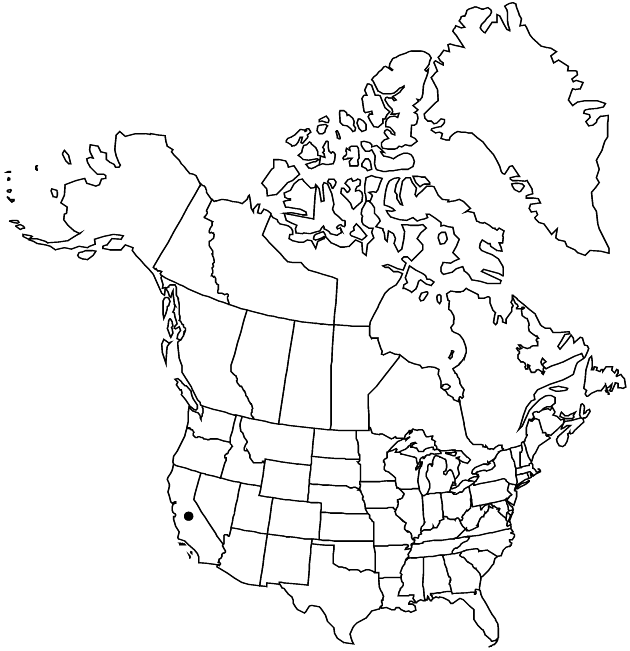Difference between revisions of "Calycadenia oppositifolia"
Fl. Francisc. 4: 423. 1897.
FNA>Volume Importer |
imported>Volume Importer |
||
| (6 intermediate revisions by 2 users not shown) | |||
| Line 7: | Line 7: | ||
|year=1897 | |year=1897 | ||
}} | }} | ||
| − | |basionyms={{Treatment/ID/ | + | |special_status={{Treatment/ID/Special_status |
| + | |code=E | ||
| + | |label=Endemic | ||
| + | }} | ||
| + | |basionyms={{Treatment/ID/Basionym | ||
|name=Hemizonia oppositifolia | |name=Hemizonia oppositifolia | ||
|authority=Greene | |authority=Greene | ||
| + | |rank=species | ||
| + | |publication_title=Bull. Torrey Bot. Club | ||
| + | |publication_place=9: 110. 1882 | ||
}} | }} | ||
|synonyms= | |synonyms= | ||
| Line 26: | Line 33: | ||
|elevation=50–900 m | |elevation=50–900 m | ||
|distribution=Calif. | |distribution=Calif. | ||
| − | |discussion=<p>Calycadenia oppositifolia is known only from the Sierra Nevada foothills of Butte County. Its closest relative may be C. multiglandulosa.</p> | + | |discussion=<p><i>Calycadenia oppositifolia</i> is known only from the Sierra <i>Nevada</i> foothills of Butte County. Its closest relative may be <i>C. multiglandulosa</i>.</p> |
|tables= | |tables= | ||
|references= | |references= | ||
| Line 35: | Line 42: | ||
-->{{#Taxon: | -->{{#Taxon: | ||
name=Calycadenia oppositifolia | name=Calycadenia oppositifolia | ||
| − | |||
|authority=(Greene) Greene | |authority=(Greene) Greene | ||
|rank=species | |rank=species | ||
| Line 49: | Line 55: | ||
|publication title=Fl. Francisc. | |publication title=Fl. Francisc. | ||
|publication year=1897 | |publication year=1897 | ||
| − | |special status= | + | |special status=Endemic |
| − | |source xml=https:// | + | |source xml=https://bitbucket.org/aafc-mbb/fna-data-curation/src/2e0870ddd59836b60bcf96646a41e87ea5a5943a/coarse_grained_fna_xml/V19-20-21/V21_671.xml |
|tribe=Asteraceae tribe Heliantheae | |tribe=Asteraceae tribe Heliantheae | ||
|subtribe=Asteraceae (tribe Heliantheae) subtribe Madiinae | |subtribe=Asteraceae (tribe Heliantheae) subtribe Madiinae | ||
Latest revision as of 20:13, 5 November 2020
Plants 10–30 cm; self-incompatible. Stems simple or sparingly branched (very slender), strigose and sparsely spreading-hairy. Leaves mostly or all opposite, 1–5 cm (little reduced distally), strigillose and ± long-hairy (at least proximally). Heads in congested, axillary glomerules (appearing whorled). Peduncular bracts lanceolate (flat, stiff, sometimes ± cylindric near apices), 4–10 mm (hispidulous, ± bristly and/or pectinate-fimbriate, especially proximally), apices ± rounded, tack-glands (0–)1–5+. Phyllaries (often reddish) 4–7 mm, abaxial faces sometimes minutely scabrous, often sparsely bristly, tack-glands usually 0, sometimes 1+. Paleae 4–7 mm. Ray florets 2–4; corollas white to reddish, tubes ca. 2 mm, laminae 6–9 mm (central lobes ± equaling or narrower than laterals, elliptic, nearly symmetric, widest near middles, sinuses equaling laminae). Disc florets 4–20; corollas white to pink, ca. 6 mm. Ray cypselae ca. 3 mm, usually smooth, glabrous. Disc cypselae ca. 3 mm, ± appressed-hairy; pappi of 8–10 usually lanceolate, acuminate scales ca. 2 mm (often 2–4 shorter, blunt). 2n = 14.
Phenology: Flowering spring–early summer.
Habitat: Open, dry meadows, hillsides
Elevation: 50–900 m
Discussion
Calycadenia oppositifolia is known only from the Sierra Nevada foothills of Butte County. Its closest relative may be C. multiglandulosa.
Selected References
None.
